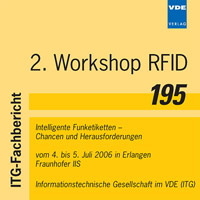Evaluating RFID Infrastructures
Conference: 2. Workshop RFID - Intelligente Funketiketten - Chancen und Herausforderungen
07/04/2006 - 07/05/2006 at Erlangen, Germany
Proceedings: 2. Workshop RFID
Pages: 9Language: englishTyp: PDF
Personal VDE Members are entitled to a 10% discount on this title
Authors:
Frischbier, Sebastian; Sachs, Kai; Buchmann, Alejandro (Databases and Distributed Systems Group, Dept. of Computer Science, TU Darmstadt, Hochschulstr. 10, 64289, Germany)
Abstract:
Investing in RFID technologies along the Supply Chain seems to be the choice of time as a lot of literature and media coverage is about its benefits. Nevertheless, the productivity enhancements achieved by using these technologies strongly depend on the software infrastructure being used. Thus, the extent of benefits regarding productivity can not easily be predicted without evaluating existing RFID infrastructures from a technical as well as a business-related point of view. Most research available today is made from a clearly business-related point of view or is restricted to abstract software models and recommendations. Given the costs and complexity of implementing an RFID infrastructure, many companies adopt preexistent solutions. However, the decision of which commercial solution to invest in should be based on a structured and comparable analysis. Surveys and reports show that companies still struggle with this problem. In this paper we point out economic as well as technical criteria based on our experiences and current literature with special regard to business-aspects. Putting these criteria together, an evaluation model for RFID infrastructures is formed which suits both technical as well as business-related considerations. Our model allows an easy characterization and comparison of different implementations being incomparable on the first sight. Due to its flexibility, it could be used either focusing on software infrastructures already being used by a company (e.g. ERP, SCM) or independently. Our model could easily be customized by stressing or neglecting assorted criteria.


